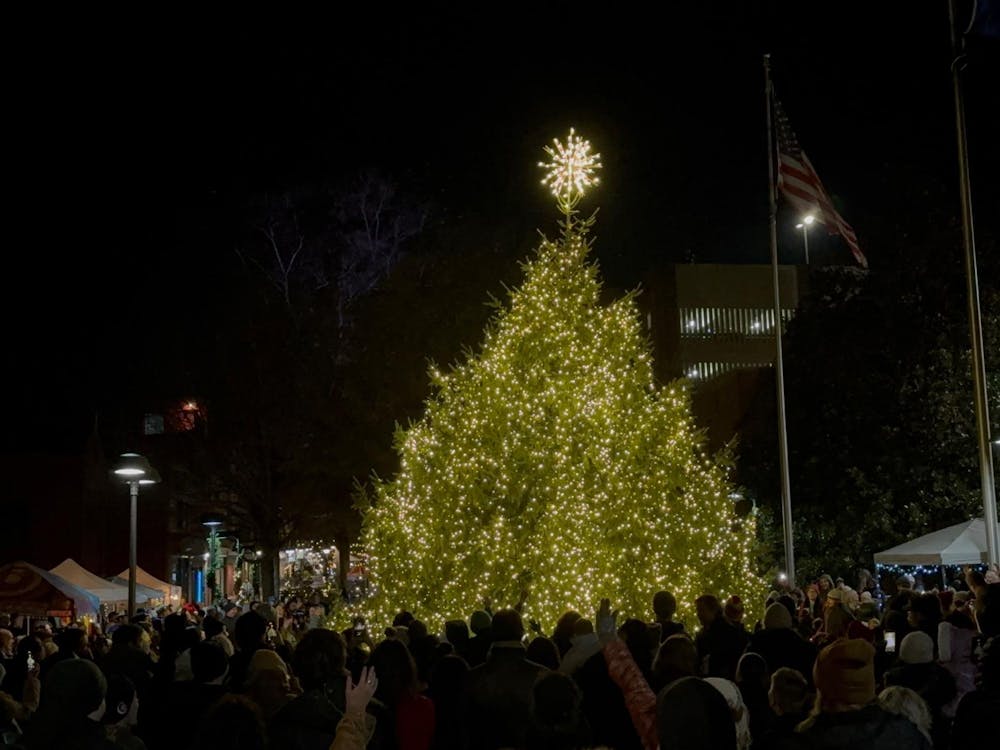Armed with a jumble of pizza boxes, laptops and film equipment, a group of enthusiastic students settled into Ruffin Hall 102. The space was charged with anticipation.
These students were gearing up to participate in a creative marathon — this year’s Adrenaline Film Project, which took place Oct. 19-22.
In partnership with Light House Studio, Adrenaline Film Project is an annual event that challenges Charlottesville filmmakers to produce a three- to five-minute short film over the course of 72 hours. Participants work in core teams of three to write, shoot, edit and screen their films, while benefiting from ongoing feedback from AFP Mentors with notable experience in the industry.
This weekend, third-year College student Hyebin Lee and second-year College students John Barnes and Jade Devriendt teamed up to participate in Adrenaline. All three are students in Art Prof. Kevin Everson’s Intro to Cinematography I course, and they decided to give AFP a try with his encouragement. Everson thus contributed to their experience — he funded their $200 entry fee, as well as the fees of three other teams of his students.
Adrenaline’s kickoff started at 5:00 p.m. at Light House Studio’s Vinegar Hill Theatre, hosted by the four Mentors. These include Steve Robillard, a director, writer and producer, Han West, a producer and founder of Meridian Content and Rachel Lane, the Program Director at Light House Studio. Jeff Wadlow, a writer, producer, director and the founder of Adrenaline Film Project, also acted as a mentor.
At this event, mentors gave each team a prop and a line of dialogue around which to build their original film. 2022’s event was Adrenaline’s 18th annual challenge, so the prompts centered on this milestone. The prop was a porcelain orb, representing an 18th wedding anniversary, and the line was “it’s legal now,” representing Adrenaline’s newly legal “age.”
Next, each team came up with three genre options, and the mentors selected one for each team to use. Barnes, Devriendt and Lee were to make a romantic comedy.
They brainstormed ideas and pitched an outline of their plot to the mentors within a couple of hours before moving to Everson’s space in Ruffin Hall on grounds to write their script.
Fueled by the pizza Everson provided for his students’ teams, the group wrote from Wednesday night until 3:00 p.m. Thursday afternoon. Barnes also spent Wednesday night casting out of Light House Studio’s actor database.
Once the actors were cast and the script was finalized and approved, shooting began at 7:00 p.m. Thursday night and finished up at 6:00 p.m. on Friday. Editing started at AFP headquarters, and the team continued editing up until the deadline of 5:00 p.m. Saturday, when they turned in their completed film for an 8:00 p.m. screening and awards ceremony. One member of Barnes, Devriendt and Lee’s cast, Allisha Edwards, won the Acting Award, one of four awards featured that night.
Barnes got a single hour of sleep on Wednesday night and Lee was up for 37 straight hours at one stage, but fatigue was not the only difficulty of filmmaking at this speed, especially due to differing levels of experience within the group.
“I will say that a downside to the 72-hour part is that for someone like Jade, who we could normally teach on a film set, you can't really teach editing when you have five hours,” Barnes said.
Despite the limitations, each team member was able to contribute to the project and learn new things on the job.
Barnes took charge of casting, directing and editing with the support of Lee, who helped organize the team’s media while Barnes broke off to play a gig with his band Friday night. Lee balanced a number of key tasks throughout the production process, including operating the camera, and her teammates noted her technical proficiency. Devriendt created multiple original props for the film, as well as covering logistical tasks and reshoots.
The team also relied on other students within the network of Everson’s cinematography program, who helped out with sound production and other on-set jobs. Having finished the process, they reflected on the key role of collaboration.
“It's not about just one skill set, one person, it's just all of us listening and working with each other,” Devriendt said. “It was truly teamwork.”
The project also forced them to let go of the paralyzing effects of perfectionism.
“When I started editing, one of the other film professors at U.Va. was like, why are you wasting your time, make a rough cut right now, I don't care about the sound,” Barnes said. “For five minutes, I could not process that because I'm just so used to making sure every fine detail in the edit is perfect. But then once I sort of let go of that … I think it ended up being better quality.”
Barnes, Devriendt and Lee reflected proudly on their achievements over the course of the 72 hour project. Though Adrenaline’s level of intensity could feel draining, the team was nonetheless motivated by their experience.
“It made me feel very alive,” Devriendt said. “I think sometimes, especially for the things that we love, we don't give ourselves the space to just jump into them and we push them to the side. With Adrenaline, you're not pushing it to the side, you're pushing literally everything else to the side and just diving into that one thing.”







